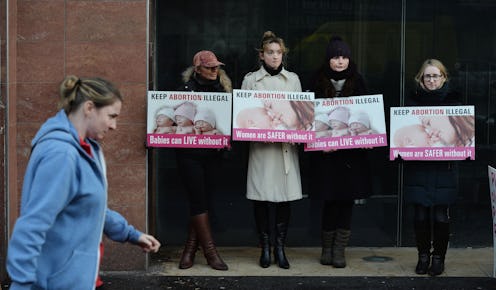
On Saturday morning, a Whittier, California, branch of Planned Parenthood alerted police about a suspicious object left outside of the clinic's front doors. Treated as a potential bomb threat, the object in question — a pipe with wires sticking out of it — was destroyed by a bomb squad, according to Whittier Daily News. It turned out to be a hoax this time, but the incident, unfortunately, is not unique. Two and a half decades after the landmark Roe v. Wade court case legalized abortion nationally, abortion clinics are routinely threatened with violence.
"The safety of our patients and staff is our top priority, and Planned Parenthood has strong security measures in place to ensure that our health centers are safe, supportive and welcoming environments," the nonprofit tells Bustle in a statement regarding Saturday's incident. The organization says that it "took every possible security precaution" after finding the suspicious object outside.
The National Abortion Federation (NAF) reported in its "2016 Violence and Disruption Statistics" that violence toward clinics that offer abortion is ongoing, and, specifically, that intimidation and disruption techniques are on the rise. According to its most recent report, which includes data as recently as 2016, "vandalism, picketing, obstruction, invasion, trespassing, burglary, stalking, assault and battery, and bomb threats" increased last year. Hate speech and harassment online also increased, the report says, and especially "intensified following the election in November."
NAF further reports that "extreme violence," which includes murders, attempted murders, and arsons decreased in 2016. But according to the National Clinic Violence Survey, conducted by the Feminist Majority Foundation (FMF), "the percentage of clinics reporting the most severe types of anti-abortion violence and threats of violence has dramatically increased" between 2014 and 2016. The contradiction seems to arise because FMF includes "blocking access to and invasions of clinics, stalking, death threats, and bombing threats" in these figures.
Between the two reports, it seems that while murders and arsons have decreased, overall agitation and disruption is increasing. Each group points to the current political climate to explain the rise.
"Given the political climate and the increase in hate incidents throughout the country, we expect the negative commentary and threats directed at abortion providers to continue," NAF wrote in its report. FMF, in part, also pointed to the debunked videos which accused Planned Parenthood of selling parts of aborted fetuses.
Referencing a fatal shooting attack at a Colorado Planned Parenthood in 2015, the FMF's "Executive Summary" section of the report mentioned that the event "led us to fear that anti-abortion extremists had been emboldened by the release of these videos." The report went on to conclude that the Clinic Violence Survey, "the first quantitative measure of nationwide violence recorded since the release of the CMP videos, corroborate these fears."
The picture that both of these reports paint is grim. Incidents which obstructed access to clinics doubled in 2016, according to NAF. And in the nearly four decades during which the group has kept track of violence targeted at abortion clinics, more picketing reportedly took place in 2016 than any other single year.
Additionally, FMF highlights that employees at abortion clinics are not immune to the intimidation. Between 2014 and 2016, there was a slight uptick in the number of employees who reported that they resigned because of "anti-abortion harassment or violence." But while the number of resignations related to these issues only reportedly increased from 5.5 percent to 5.66 percent, several years ago those percentages were much smaller. According to the report, in 2008 and 2010, those resignations were tallied at 4 percent and 2.2 percent, respectively.
The NAF's report further said that it is concerned that Attorney General Jeff Sessions will not "adequately enforce" the laws that protect abortion providers and their patients. Sessions personally opposes abortion, but has said that, as Attorney General, he would respect Roe v. Wade.
The numbers for 2017 have not yet been released, but since the 2016 election was used to explain violence and threat increases last year, it's difficult to view the pattern optimistically.